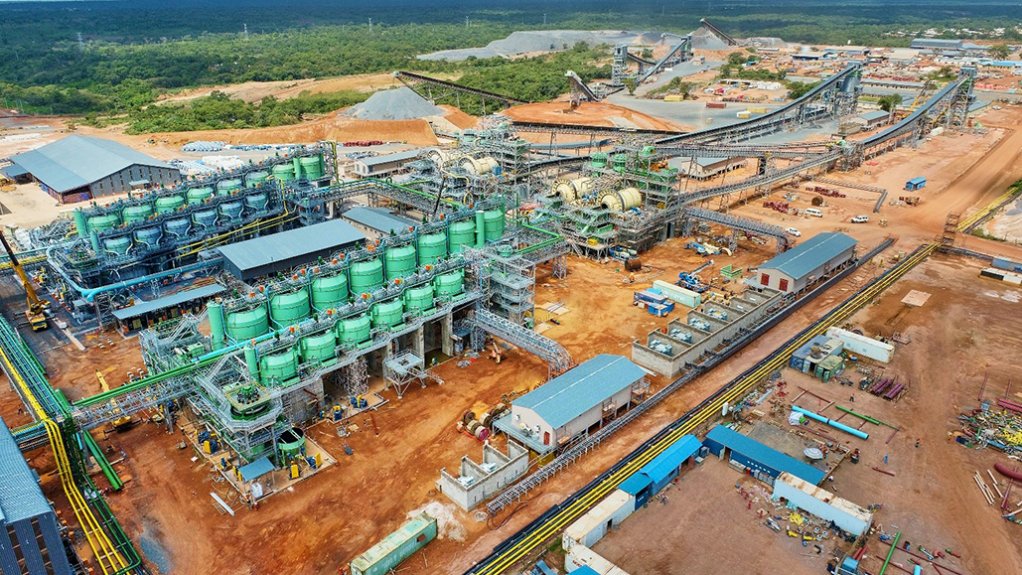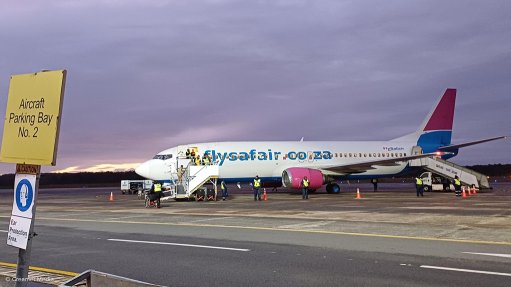Kamoa-Kakula sets another copper concentrate production record
TSX-listed Ivanhoe Mines' Kamoa-Kakula copper complex in the Democratic Republic of Congo (DRC) produced a record 103 786 t of copper concentrate in the second quarter, compared with the 93 603 t produced in the first quarter, representing an 11% increase quarter-on-quarter.
This achievement was made possible by the successful completion of the debottlenecking programme ahead of schedule in the first quarter, allowing the Phase 1 and 2 concentrators to operate at an increased throughput rate of 9.2-million tonnes a year.
During May, the Phase 1 and 2 concentrators set a monthly production record of 35 856 t of copper in concentrate. Despite the shorter month of June, they still managed to produce 33 104 t of copper. Throughout the second quarter, the concentrators processed about 2.2-million tonnes of ore, with an average feed grade of 5.2% copper. This included high-grade ore from the Kakula mine and additional ore from surface stockpiles to surpass the original design capacity.
The quarter also saw a consistent copper recovery rate of 87.2%.
Considering the debottlenecking efforts implemented since February, Kamoa-Kakula's year-to-date production stands at 197 389 t of copper in concentrate. The projected yearly production guidance for the full-year remains at between 390 000 t and 430 000 t of copper in concentrate for Kamoa-Kakula.
Despite facing maintenance shutdowns in June and intermittent grid instability, Kamoa-Kakula achieved a record quarterly production. Since late in the fourth quarter last year, Kamoa Copper has been collaborating with DRC State-owned power company La Société Nationale d’Electricité (SNEL) to address grid infrastructure instability in the southern region. Kamoa Copper has identified necessary upgrades and has initiated a project plan to implement improvements. The mobilisation of resources is under way, with vendor selection and equipment procurement in progress.
In parallel, Ivanhoe says Kamoa Copper's engineering team is actively working on enhancing on-site backup power generation capacity and exploring the possibility of importing additional power from the Zambian grid to protect Kamoa-Kakula from future instability.
Over the next 12 to 18 months, the on-site backup power generation capacity will be increased in a phased manner. In the second quarter, 11 MW of new generator capacity were installed, bringing the total backup power generation capacity to about 48 MW. Delivery of an additional 32 MW in backup generation capacity, which will be sufficient to power Kamoa-Kakula's Phase 1 and 2 operations during grid disruptions, is scheduled to begin later this year.
Further, more than 100 MW of backup generation capacity has been ordered and is expected to be installed next year, coinciding with the completion of the Phase 3 concentrator and smelter currently under construction.
Discussions are progressing to secure up to 100 MW of additional power through the Zambian grid interconnector, with the initial phase expected to be ready in the third quarter.
“We are witnessing the rapid rise of the world's next major copper mining complex. Kamoa-Kakula is set to become the fourth-largest copper producer in the world and the biggest copper mine in Africa, with a production rate of about 650 000 t/y . . . consistently providing strong returns on investment and generating exceptional free cash flow in the near term,” Ivanhoe founder and executive co-chairperson Robert Friedland says.
The successful completion of Kamoa-Kakula's debottlenecking programme for Phase 1 and Phase 2 came ahead of schedule on February 27. The programme increased the ore processing capacity by 22%, from 7.6-million to 9.2-million tonnes a year, enabling a production capacity of about 450 000 t/y of copper in concentrate. For comparison, last year, Kamoa-Kakula produced 333 497 t of copper in concentrate.
Additionally, a weekly production record of 9 710 t of copper in concentrate was achieved in late April. Shortly after the quarter ended, on July 2, a record daily milling rate of 29 968 dry metric tonnes was achieved, equivalent to a milling rate of ten-million tonnes a year.
During the second quarter, Kamoa-Kakula milled a record 2.2-million tonnes of ore with an average copper grade of 5.2%. As the expansion of underground infrastructure at the Kakula mine continues, ore will be sourced from surface stockpiles to optimise copper production.
The high- and medium-grade ore surface stockpiles at Kamoa-Kakula were about 4.1-million tonnes, estimated to have a copper grade of 3.71% by the end of June. In the second quarter, the operation mined 2.19-million tonnes of ore with a copper grade of 5.13%, consisting of 2-million tonnes from the Kakula mine with a grade of 5.39% copper, including 680 000 t from the high-grade centre with a grade of 6.97% copper.
Additionally, the installation of the ball mill for Kamoa-Kakula's Phase 3 concentrator has begun, marking the start of scaffold erection. The overall progress of the project stands at 52% completion.
The Phase 3 expansion at Kamoa-Kakula, which includes the construction of two new underground mines – Kamoa 1 and Kamoa 2 – and a five-million-tonne-a-year concentrator plant, is progressing well and remains on schedule for initial production in the fourth quarter of next year, the company says.
An important component of the expansion is the integration of what Ivanhoe says is Africa's largest direct-to-blister flash smelter, to be built at Kakula alongside the existing Phase 1 and Phase 2 concentrator plants. This smelter will have a capacity of processing 500 000 t/y of copper.
The infrastructure developed for Phase 3, including power and surface facilities, will be designed to accommodate future expansions of the Kamoa-Kakula copper complex. Underground mining activities are planned to begin this year at Kamoa 1 and in 2025 at Kamoa 2. Both mines will use the same mechanised drift-and-fill mining methods currently employed at the Kakula mine.
Additionally, the Phase 3 concentrator will adopt the same upscaled process design as the Phase 1 and 2 concentrators.
The detailed engineering design and procurement activities are mostly completed, with fabrication progressing to 61% completion. Ivanhoe says that equipment deliveries to the site are steadily increasing, with 137 out of the projected 1 799 truck deliveries already completed. Another 224 trucks, laden with equipment, are currently en route to the site.
The civil works for the project are also nearing completion, with about 25 000 m3 of concrete poured out of the total 30 000 m3. Additionally, the steel, mechanical, piping, and plate work contract was awarded during the quarter, and the delivery of structural steel has begun. Out of the required 7 250 t of structural steel, more than 4 000 t has been shipped to the site. Orders for about 50 000 m of piping, out of a total of 73 000 m, have also been placed.
The final shipment of the primary and secondary ball mill equipment package, weighing 1 830 t, has been sent by Chinese company CITIC Heavy Industries and is expected to arrive at the Port of Durban soon.
The installation of the first of the two ball mills has begun at the Phase 3 concentrator site, with progress made on scaffolding work. Delivery of the cone crushers, flotation cells, vibrating screens, concentrate filters, cyclone cluster, compressor, and pump mechanical equipment packages are imminent, Ivanhoe says. Further, the apron feeder has recently been positioned inside the Phase 3 run-of-mine stockpile tunnel.
The construction of the smelter plant has reached about 18% completion, and the overall progress of the project stands at 52%. The smelter remains on track to begin production in the fourth quarter of next year.
In terms of infrastructure, all terracing earthworks were completed last year, and civil construction work is well advanced, with major foundations for equipment and buildings already completed. Most of the structural steel and equipment have been ordered and are currently being manufactured. The initial batches of structural steel and mechanical equipment have been delivered to the site, with 654 truckloads out of an estimated total of 4 000 already received. The main mechanical and electrical construction contractors have been appointed, and mobilisation is underway. Also, mechanical erection has started for the direct-to-blister flash furnace, electric slag-cleaning furnace, and gas cleaning system.
About 2 000 construction workers are currently working at the smelter site, and this workforce is expected to peak at 3 000 in December.
The Kamoa-Kakula smelter will employ direct-to-blister flash smelting technology supplied by Finish original-equipment manufacturer Metso Outotec and adhere to the International Finance Corporation's emissions standards.
As part of the Phase 3 expansion, the project includes the refurbishment of Turbine 5 at the Inga 2 hydroelectric power station, providing an additional 178 MW of clean hydroelectric power to the national grid. This power will meet the requirements of the Phase 3 concentrator, the direct-to-blister flash smelter, and allow for future expansions. The smelter aims to produce 99.7% pure blister anode copper with one of the lowest carbon dioxide emissions per tonne of copper globally, Ivanhoe says.
The smelter is designed to process about 1.2-million tonnes a year of dry concentrate feed, using a blend of concentrate produced from Kakula Phase 1 and 2 and Kamoa Phase 3 and future Phase 4 concentrators. Under the Kamoa-Kakula 2023 integrated development plan, the smelter is projected to accommodate about 80% of Kamoa-Kakula's total concentrate production. Additionally, Kamoa-Kakula will continue to toll-treat concentrates under a ten-year agreement with the nearby Lualaba Copper Smelter, accounting for about 150 000 t of copper concentrate yearly.
The smelter will also produce about 650 000 t/y to 800 000 t/y of high-strength sulfuric acid, which is in high demand in the DRC for copper recovery from oxide ores using the solvent extraction and electrowinning process. The DRC market consumed about 6-million tonnes of acid in 2022, with spot prices reaching up to $600/t in Kolwezi.
Upon the start of Phase 3 production, the Kamoa-Kakula Copper Complex will have a processing capacity of more than 14-million tonnes a year. In the first five years of Phase 3, from 2025 to 2029, copper production from the combined Kamoa-Kakula copper complex is expected to average about 650 000 t/y, with a cash cost of $1.15/lb. This production rate is expected to establish the Kamoa-Kakula Copper Complex as the fourth-largest copper mining operation in the world.
Article Enquiry
Email Article
Save Article
Feedback
To advertise email advertising@creamermedia.co.za or click here
Comments
Announcements
What's On
Subscribe to improve your user experience...
Option 1 (equivalent of R125 a month):
Receive a weekly copy of Creamer Media's Engineering News & Mining Weekly magazine
(print copy for those in South Africa and e-magazine for those outside of South Africa)
Receive daily email newsletters
Access to full search results
Access archive of magazine back copies
Access to Projects in Progress
Access to ONE Research Report of your choice in PDF format
Option 2 (equivalent of R375 a month):
All benefits from Option 1
PLUS
Access to Creamer Media's Research Channel Africa for ALL Research Reports, in PDF format, on various industrial and mining sectors
including Electricity; Water; Energy Transition; Hydrogen; Roads, Rail and Ports; Coal; Gold; Platinum; Battery Metals; etc.
Already a subscriber?
Forgotten your password?
Receive weekly copy of Creamer Media's Engineering News & Mining Weekly magazine (print copy for those in South Africa and e-magazine for those outside of South Africa)
➕
Recieve daily email newsletters
➕
Access to full search results
➕
Access archive of magazine back copies
➕
Access to Projects in Progress
➕
Access to ONE Research Report of your choice in PDF format
RESEARCH CHANNEL AFRICA
R4500 (equivalent of R375 a month)
SUBSCRIBEAll benefits from Option 1
➕
Access to Creamer Media's Research Channel Africa for ALL Research Reports on various industrial and mining sectors, in PDF format, including on:
Electricity
➕
Water
➕
Energy Transition
➕
Hydrogen
➕
Roads, Rail and Ports
➕
Coal
➕
Gold
➕
Platinum
➕
Battery Metals
➕
etc.
Receive all benefits from Option 1 or Option 2 delivered to numerous people at your company
➕
Multiple User names and Passwords for simultaneous log-ins
➕
Intranet integration access to all in your organisation





















